How to Use the Right to Choose Scheme for Autism Assessments in the UK (2025)

Key Takeaways:
The NHS Right to Choose scheme allows you to access private autism assessments with NHS funding, potentially reducing waiting times from 2-4 years to around 5.5 months.
To use the scheme, first book a dedicated GP appointment and prepare essential documentation including a pre-written referral letter, list of CQC-registered providers and relevant NHS Constitution sections.
Once your GP makes the referral, funding typically gets approved within 4-8 weeks, with assessment costs covered between £650-£2000.
The process requires careful preparation and regular follow-up, but offers a faster route to assessment while maintaining NHS quality standards.
Essential Resources:
- NHS Constitution for England – Legal framework supporting your right to choose
- Clinical Partners Right to Choose – Leading provider with 5.5 month waiting times
- CQC Provider Search – Find registered autism assessment providers
- NHS Mental Health Services Finder – Local service information
- National Autistic Society – Additional support while waiting for assessment
Right to Choose Autism Assessments: With NHS waiting times reaching up to 4 years in some regions, this scheme has become a lifeline for many UK residents. Here’s how to use the Right to Choose framework to access faster autism assessments legally!
What is the NHS ‘Right to Choose’ for Autism Assessments?
Navigating the path to an autism assessment can be overwhelming, but did you know that the NHS “Right to Choose” framework can offer a quicker route?
This comprehensive 2025 guide explains your right to choose autism assessments in the UK, breaking down the legalities and funding options available to you.
If you’re also considering the traditional CAMHS route, our guide to the CAMHS referral process provides essential information.
For more information about your rights and how to use them, you can visit the NHS page on your choices: NHS – Your Choices in the NHS.
The 2012 Health and Social Care Act also supports this by requiring NHS commissioners to enable patient choice. This means that Integrated Care Systems (ICSs) must honor your request for a private assessment referral.
Knowing which sections to reference is important. Under the National Health Service Commissioning Board and Clinical Commissioning Groups (Responsibilities and Standing Rules) Regulations 2012, there are clauses that support your right to choose. Many healthcare providers may not be fully aware of these regulations, but understanding them is essential.
It’s also important to know that the NHS Constitution is legally binding. When advocating for your Right to Choose, you can confidently reference your legal rights under both the Constitution and the Healthcare Act. Many people do not realise that these rights are clearly stated in law!
Pro Tip: Always mention both pieces of legislation in your communications. Referring to “the NHS Constitution in conjunction with the 2012 Health and Social Care Act” gives you stronger support than just saying you have a “right to choose.” It’s like having a legal advantage!
Knowledge is power when it comes to healthcare rights. Many individuals feel relieved when they learn they don’t have to accept long waiting times. The system may seem complicated, but once you understand these legal foundations, you have solid ground to stand on. It’s worth taking the time to learn about these rights!
How Do I Use the ‘Right to Choose’ for Autism Assessment? A Step-by-Step Guide
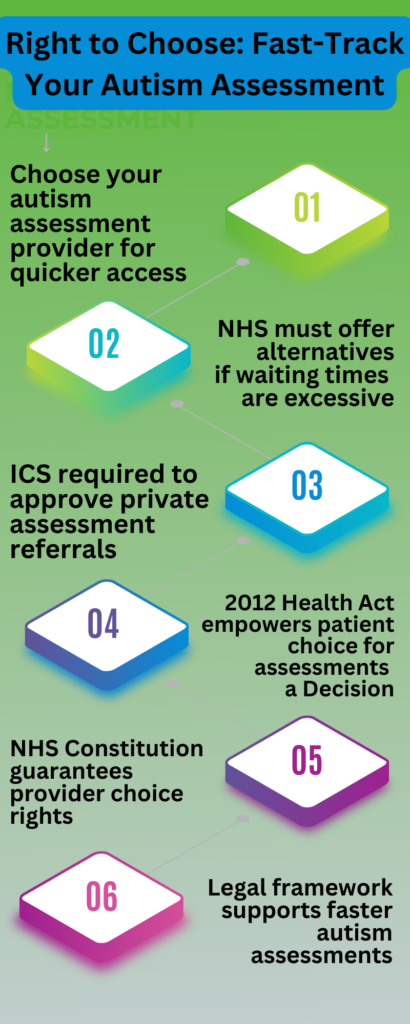
1. Book a GP Appointment:
- Schedule a dedicated appointment with your GP. Mention that the appointment is specifically for discussing the Right to Choose autism assessment.
2. Prepare Essential Documents:
- Create a pre-written referral letter for your GP to use.
- Compile a list of CQC-registered (Care Quality Commission) private providers, including their pricing.
- Print copies of relevant sections from the NHS Constitution.
- Gather evidence of providers’ NHS experience and qualifications.
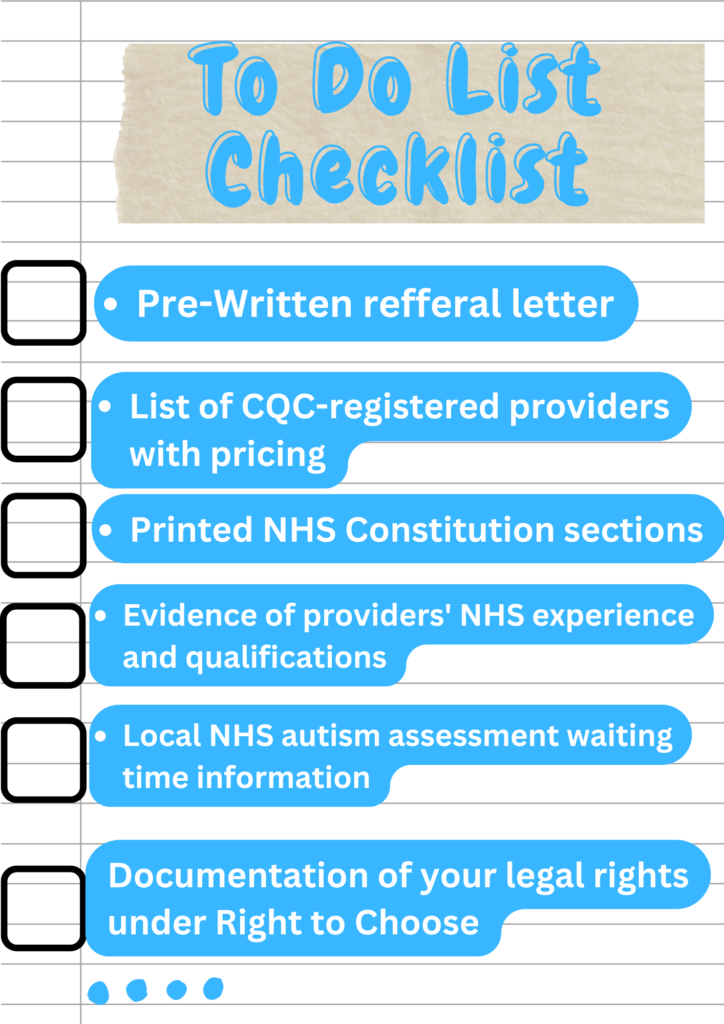
3. Educate Your GP:
- Bring documentation that outlines your legal rights, under the NHS Constitution and the 2012 Health and Social Care Act, as your GP may be unfamiliar with the Right to Choose process.
4. Follow Up on Your Referral:
- Keep copies of all correspondence related to your referral.
- Follow up every two weeks on the progress of your referral with your GP and Integrated Care System (ICS).
5. Understand Funding:
- Be aware that most ICS boards approve funding within 4-8 weeks.
- Know that standard funding caps typically range from £650-£2000.
- Ensure that private providers are CQC registered and that assessments meet NICE (National Institute for Health and Care Excellence) guidelines.
6 . Receive Confirmation:
- Once approved, funding will go directly to your chosen provider.
- Expect confirmation letters from both your ICS and the private clinic.
7. Timeline:
- The entire process usually takes about 6-12 weeks from your GP appointment to the assessment date.
How Does the NHS Constitution Protect My ‘Right to Choose’ for Autism Assessments?
To confirm your right to choose, refer directly to the NHS Constitution:
- Location: This information can be found under the heading “Patients and the public: your rights and the NHS pledges to you,” specifically in the subheading “Access to health services,” in the 8th paragraph. It states: “You have the right to access certain services commissioned by NHS bodies within maximum waiting times, or for the NHS to take all reasonable steps to offer you a range of suitable alternative providers if this is not possible.”
What Steps Should I Take for the ‘Right to Choose’ Autism Process?
Getting started with “Right to Choose” is straightforward once you know the essential steps. First, book a dedicated ‘GP’ (General Practitioner) appointment specifically mentioning it’s for “Right to Choose” autism assessment – this ensures you get adequate time to discuss your case.
Your GP may be unfamiliar with “Right to Choose”, so bring documentation proving your legal rights. The NHS Constitution and 2012 Health and Social Care Act sections are particularly important. Keep copies of all correspondence and follow up every two weeks on your referral’s progress.
Key funding tips:
- Most ICS (Integrated Care Systems) boards approve funding within 4-8 weeks.
- Standard funding caps range from £650-£2000.
- Private providers must be CQC registered.
- Assessment must meet “NICE” (National Institute for Health and Care Excellence) guidelines.
- Provider must have NHS experience.
Once approved, funding goes directly to your chosen provider. You’ll receive confirmation letters from both your ICS and the private clinic. The entire process typically takes 6-12 weeks from GP appointment to assessment date – significantly faster than typical NHS waiting lists.
Remember: persistence and proper documentation are crucial. Follow up regularly but professionally with your GP surgery and ICS board. Keep a paper trail of all communications. With the right preparation, Right to Choose offers a reliable path to faster autism assessment.
What Documentation is Required for the ‘Right to Choose’ Autism Assessment Process?
Gathering the necessary documentation is a key step in the Right to Choose process. This might include previous medical records, school reports, and any questionnaires you’ve completed.
You may find that some of the questions asked in these documents are similar to those asked during a CAMHS assessment.
If you want to prepare yourself, read our dedicated article which answers the CAMHS autism assessment questions
The Right to Choose application process involves several essential steps and documents that require careful preparation to ensure a smooth approval. Key components include:
- Cost Breakdown: A detailed list of expected assessment costs.
- NICE Guidelines Compliance Statement: Confirmation that the assessment meets NICE standards.
- ICS Funding Request Forms: Required forms for requesting funding from Integrated Care Systems.
By understanding these requirements, you can streamline your application process. Now, let’s look at the diagram that outlines the specific steps involved in the Right to Choose process.
Timeline Overview:
- GP Appointment and Referral: 1-2 weeks.
- ICS Funding Review: 4-6 weeks.
- Provider Assessment Booking: 1-2 weeks.
- Total Process: Usually 6-10 weeks.
Following up is essential. Contact your GP surgery after one week if you haven’t received confirmation of the referral. Check with the ICS funding team every two weeks for application status updates. Keep written records of all communications, including dates, names, and reference numbers.
Common Rejection Reasons and Solutions:
- Incomplete Provider Information Solution: Submit full provider credentials and CQC registration.
- Missing NHS Experience Evidence Solution: Include provider’s NHS work history.
- Unclear Local Waiting Times Solution: Attach official NHS waiting time documents.
- Incorrect Funding Amounts Solution: Ensure costs match ICS approval limits.
Appeals Process: If rejected, you have the right to appeal within 28 days. Include:
- Original application.
- Rejection letter.
- New evidence addressing rejection reasons.
- NHS Constitution and Healthcare Act references (collate any evidence from healthcare professionals).
- Updated provider information if needed.
Appeals typically take 2-4 weeks for review. You can submit up to three appeals for the same application. Each appeal should include new or clarified information addressing the specific rejection reasons.
The key to success is thorough preparation and proper documentation. Keep all paperwork organised and readily available throughout the process. This systematic approach significantly increases the likelihood of approval.
How Much Will a Private Autism Assessment Cost Using the ‘Right to Choose’?
Understanding the costs associated with private autism assessments through the Right to Choose framework is crucial for financial planning.
The actual cost can vary widely, depending on the provider and the specific assessment required.
If you’re looking to find the most affordable options, be sure to check our guide to the cheapest autism assessment in the UK.
Funding Considerations:
- ICS funding caps typically range from £650-£2000.
- Most assessments cost between £1,200-£1,500.
Additional costs may include:
Post-diagnostic support
Written reports
Follow-up sessions
Travel expenses
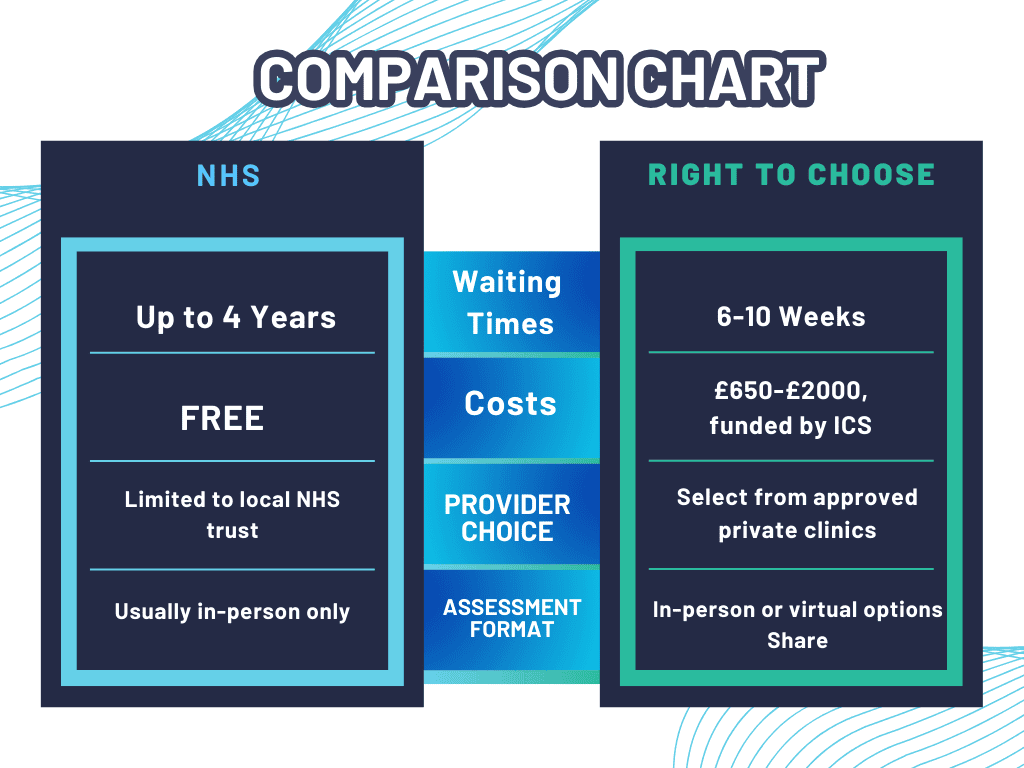
How Should I Choose a Private Autism Assessment Provider Under the ‘Right to Choose’?
What you should look for in a provider
Selecting the right provider for your autism assessment is a crucial step in the Right to Choose process. The following guide will help you make an informed decision.
Essential Provider Requirements:
- Current CQC registration.
- Proven NHS experience.
- Specialists in autism assessment.
- Clear assessment pathway.
- Transparent pricing structure.
- Reasonable waiting times.
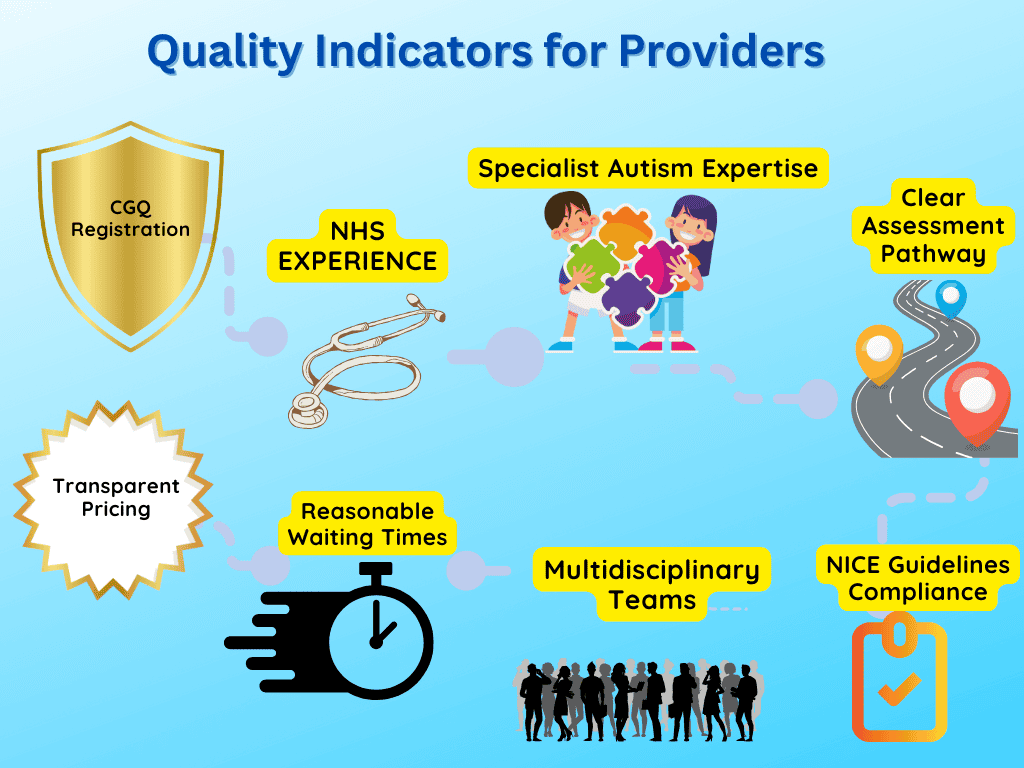
Assessment Format Options:
In-Person Assessments
- Traditional face-to-face format.
- May require travel.
- Often available in major cities.
Online Assessments
- Conducted via secure video platform.
- No travel required.
- Often more cost-effective.
- Suitable for those with travel or sensory difficulties.
Quality Indicators to Look For:
- Multidisciplinary assessment team.
- Clear assessment timeline.
- Detailed post-diagnostic support.
- NICE ( National Institute for Health and Care Excellence) guidelines compliance.
- Regular communication throughout process.
- Written reports included in price.
- Access to post-diagnostic resources.
Important Questions to Ask Providers:
- Current waiting times.
- Assessment team qualifications.
- Total cost breakdown.
- Report delivery timeframe.
- Post-diagnostic support availability.
- Assessment format options.
- Cancellation policy.
What Happens After My ‘Right to Choose’ Autism Assessment is Approved?
Once you’ve received approval for your autism assessment through the Right to Choose process, it’s time to move forward with the next steps. This phase is crucial as it sets the stage for your assessment and ensures you’re well-prepared for what lies ahead.
Booking Your Assessment:
The first step after approval is to book your assessment. Contact the private provider you selected during the Right to Choose process. When you call, be sure to mention that you have been approved for an autism assessment under the Right to Choose. This will help the staff understand your situation and prioritize your appointment. It’s a good idea to have a few dates in mind for when you’d like to schedule the assessment, as this can make the booking process smoother.
Required Pre-Assessment Documentation:
Before your assessment day, you’ll need to gather some important documents. Typically, these may include:
- Referral Letter: A copy of the referral letter from your GP or healthcare provider.
- Identification: A form of identification, such as a passport or driver’s license.
- Medical History: Any relevant medical history or previous assessments that may help inform the evaluation.
- Questionnaires: Some providers may send questionnaires before your assessment. Fill these out thoroughly and bring them with you.

Having these documents ready will not only streamline the process but also ensure that the assessors have all the information they need to provide a thorough evaluation.
Assessment Day Preparation:
On the day of your assessment, it’s essential to be prepared both mentally and physically. Here are some tips:
- Arrive Early: Aim to arrive at least 15 minutes early. This gives you time to check in and calm any nerves before your appointment.
- Dress Comfortably: Wear comfortable clothing that makes you feel at ease. This can help you relax during the assessment.
- Bring a Support Person: If possible, bring a family member or friend with you for support. They can help you remember details and provide emotional comfort during what can be a stressful time.
- Post-Diagnosis Support Options: After your assessment, you’ll receive feedback regarding your diagnosis. Regardless of the outcome, it’s essential to know what support options are available.
- Counseling Services: Many individuals find counseling helpful in navigating their feelings post-diagnosis.
- Support Groups: Look for local or online support groups where you can connect with others who share similar experiences.
- Educational Resources: Familiarise yourself with resources that provide information about autism and coping strategies.
Remember, receiving a diagnosis can bring up various emotions, and it’s okay to seek help as you process this information.
Navigating the steps after receiving approval for an autism assessment can feel overwhelming, but with careful preparation and knowledge of what to expect, you can approach this process with confidence.
By booking your assessment promptly, gathering necessary documentation, preparing for the day itself, and knowing your post-diagnosis support options, you set yourself up for success on this important journey towards understanding and support.
Conclusion:
The ‘Right to Choose’ can be a powerful tool in getting your child the autism assessment they need. While exploring this option, remember to investigate all potential funding avenues to make this process more accessible.
If you’re navigating the complex landscape of funding, see our guide on funding for private autism assessments in the UK. And remember that there are also free assessments available which you can read in our article on Free Autism and ADHD Tests.
The ‘Right to Choose’ framework offers a significant opportunity for families in the UK to access timely autism assessments.
By understanding your rights and taking proactive steps, you can advocate for your child’s needs and unlock a faster path to diagnosis and support.
Remember, you’re not alone on this journey; resources and guidance are available to help you every step of the way
FAQs Section:
Additional Assessment Funding Options
- Personal Health Budgets (PHBs): Personal Health Budgets allow individuals with specific health needs to have greater control over how their healthcare funding is spent, including autism assessments. You can learn more about PHBs and how to apply for them through the NHS.
Helpful Link: NHS Personal Health Budgets
- Direct Payments: Direct payments enable individuals to manage their care and support services themselves, allowing parents or guardians of children with autism to use the funds for assessments and therapies. More information can be found on how to access direct payments through your local council.
Helpful Link: Direct Payments Guidance
- Charitable Organisations: Various charities provide grants or funding for autism assessments. Organizations like the National Autistic Society may offer financial assistance or resources to help cover assessment costs.
Helpful Link: National Autistic Society Grants
- Local Authority Funding: Some local councils provide funding for autism assessments through their social services departments. You can inquire about available resources and eligibility criteria by contacting your local authority.
Helpful Link: Find Your Local Council
- Educational Funding: If the assessment relates to educational needs, families may access funding through Educational Health and Care (EHC) plans. Schools can request assessments that may lead to additional support or funding for children with autism.
Helpful Link: Special Educational Needs and Disabilities (SEND) Code of Practice
- Health Insurance: Some private health insurance plans may cover autism assessments and related services. Check with your provider to see if your policy includes coverage for these assessments.
Helpful Link: Find a Health Insurance Provider
- Community Support Programs: Many communities have programs designed to support families with children who have special needs, offering financial assistance or resources for obtaining necessary assessments.
Helpful Link: Local Support Services
Compiled by Dwayne and Charlene, at specialneedsresourcesdirectory.co.uk – committed to connecting families and empowering lives through our dedicated special needs resources directory. As parents of a son with autism, we understand the challenges families face and aim to provide reliable, researched information to support your journey.
About the Authors: Dwayne and Charlene are committed to providing accessible and reliable information to families with special needs. Charlene’s extensive experience working with children of all abilities as a professional childminder combines with Dwayne’s personal journey as a father to their son with autism to provide families with a deep understanding of the issues families face. Together, they offer practical guidance and support.
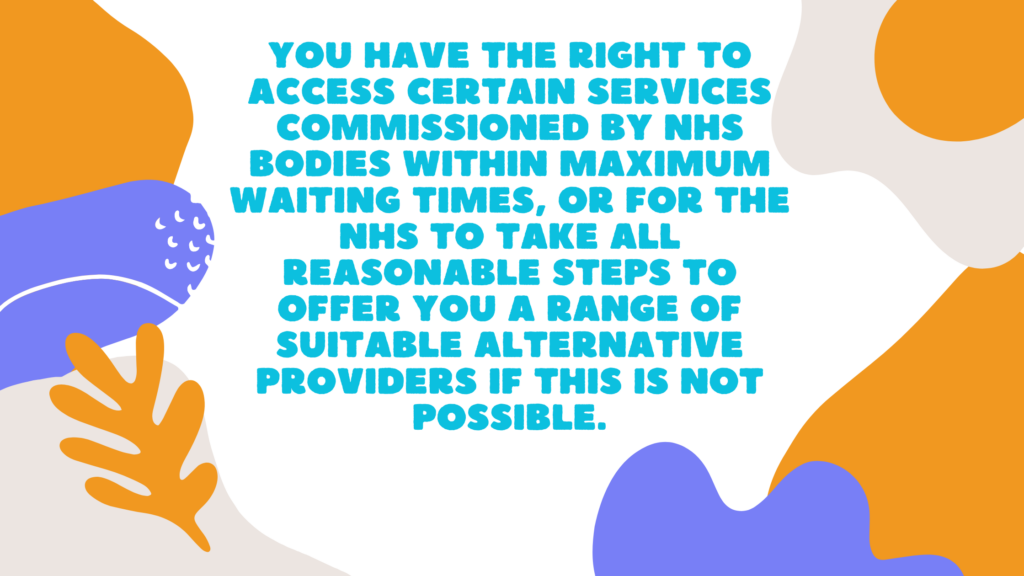
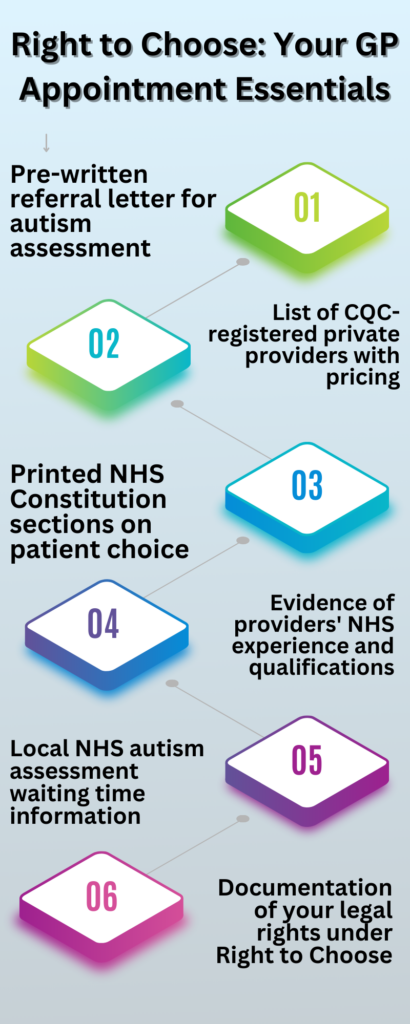


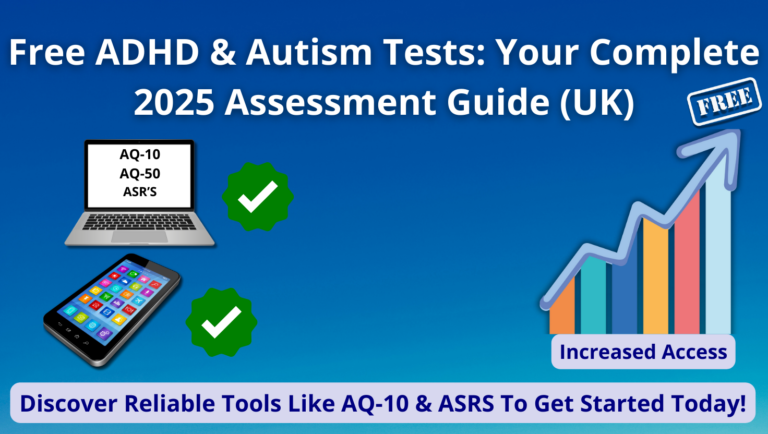

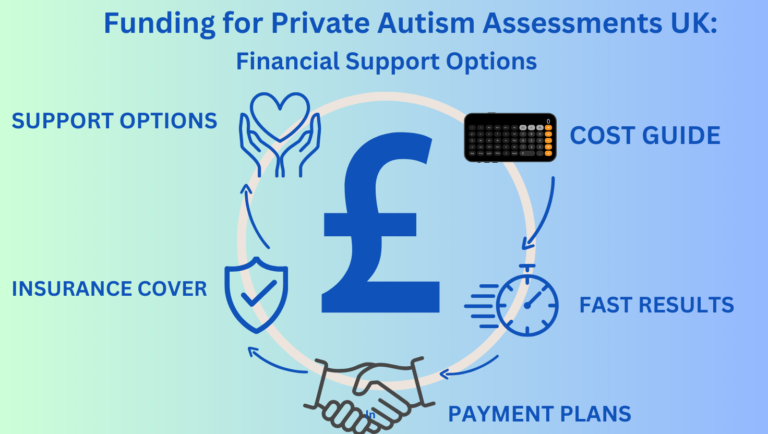

Hi there, just wanted to say, I loved this blog post.
It was funny. Keep on posting!